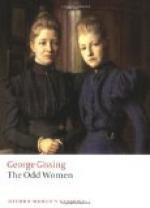‘The girls,’ Bevis was saying, ’leave on Thursday. The rest of the week I shall be alone. On Monday the furniture will be stowed away at the Pantechnicon, and on Tuesday—off I go.’
A casual listener could have supposed that the prospect pleased him. Monica, with a fixed smile, looked at the other groups conversing in the room; no one was paying any attention to her. In the same moment she heard a murmur from her companion’s lips; he was speaking still, but in a voice only just audible.
‘Come on Friday afternoon about four o’clock.’
Her heart began to throb painfully, and she knew that a treacherous colour had risen to her checks.
’Do come—once more—for the last time. It shall be just as before—just as before. An hour’s talk, and we will say good-bye to each other.’
She was powerless to breathe a word. Bevis, noticing that Mrs. Cosgrove had thrown a look in their direction, suddenly laughed as if at some jest between them, and resumed his lively strain of talk. Monica also laughed. An interval of make-believe, and again the soft murmur fell upon her ear.
’I shall expect you. I know you won’t refuse me this one last kindness. Some day,’ his voice was all but extinguished, ’some day—who knows?’
Dreadful hope struck through her. A stranger’s eyes turned their way, and again she laughed.
‘On Friday, at four. I shall expect you.’
She rose, looked for an instant about the room, then offered him her hand, uttering some commonplace word of leave-taking. Their eyes did not meet. She went up to Mrs. Cosgrove, and as soon as possible left the house.
Widdowson met her as she crossed the threshold of home. His face told her that something extraordinary had happened, and she trembled before him.
‘Back already?’ he exclaimed, with a grim smile. ’Be quick, and take your things off, and come to the library.’
If he had discovered anything (the lie, for instance, that she told him a month ago, or that more recent falsehood when she pretended, without serious reason, to have been at Miss Barfoot’s lecture), he would not look and speak thus. Hurrying, panting, she made a change of dress, and obeyed his summons.
‘Miss Nunn has been here,’ were his first words.
She turned pale as death. Of course he observed it; she was now preparing for anything.
’She wanted to see you because she is going away on Monday. What’s the matter?’
‘Nothing. You spoke so strangely—’
’Did I? And you look very strangely. I don’t understand you. Miss Nunn says that everybody has noticed how ill you seem. It’s time we did something. To-morrow morning we are going down into Somerset, to Clevedon, to find a house.’
‘I thought you had given up that idea.’
‘Whether I had or not doesn’t matter.’
In the determination to appear, and be, energetic, he spoke with a rough obstinacy, a doggedness that now and then became violence. ’I am decided on it now. There’s a train to Bristol at ten-twenty. You will pack just a few things; we shan’t be away for more than a day or two.’




